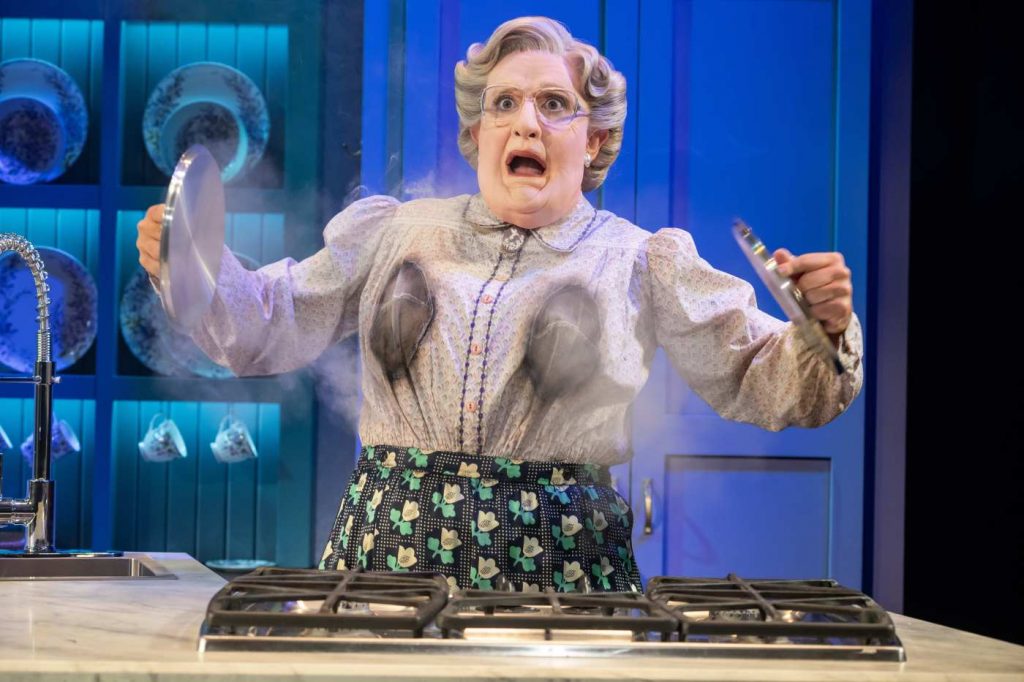Mrs. Doubtfire is coming home.
This time around, however, there will be far more singing, as the Broadway touring production of the “Mrs. Doubtfire” musical is performed at the Orpheum Theatre in San Francisco July 2-28. Tickets are $55-$158, broadwaysf.com.
It marks the Northern California premiere of the play, which is based on the 1993 hit film of the same name that starred Bay Area comedic legend Robin Williams and was set in San Francisco. The beloved storyline follows a divorced male actor who comes up with a plan to masquerade as a elderly female nanny — dubbed Euphegenia Doubtfire — in order to be able to spend more time with his children.
Yeah, the plot sounds ludicrous. But, wow, does Williams make the whole thing work in what turned out to be one of the late actor’s most cherished roles.
Now, it’s up to Rob McClure, who knows he’s attempting to fill some mighty big shoes as the lead in this play. Yet, the New Jersey actor has drawn much applause for originating this role onstage (first in Seattle in 2019 and then, the following year, on Broadway). McClure’s efforts earned him his second Tony Award nomination for Best Actor in a Musical, following the one he received in 2013 for “Chaplin.”
I recently spoke with McClure about bringing “Mrs. Doubtfire” back to The City by the Bay.
Q: Hey, Rob. We’re looking forward to seeing you and “Mrs. Doubtfire” in San Francisco. But it will be kind of a return engagement, given that you already dressed up as the Bay Area’s favorite Scottish nanny and roamed about the city a few weeks back.
A: We did the full prosthetic Doubtfire and sort of unleashed her into the city. And I was on the brink of tears all day, because I felt like Santa Claus. People were so happy to see her. It was so cool.
Q: Sounds cool. I am just imagining grabbing lunch someplace and looking up from my phone to suddenly see Mrs. Doubtfire walking on by
A: It was really a blast. The amount of tearful selfies and (people saying), “Oh, my God, it’s Mrs. Doubtfire.” Remember Sam Neill in “Jurassic Park” the first time he goes, “It’s a dinosaur”? There were like hundreds of people going, “It’s Mrs. Doubtfire.” And I would turn around and there would be 150 people following me and trying to take a picture. It’s an amazing thing Robin Williams created. The legacy of this character — it’s like it’s become Mickey Mouse. She exists beyond all of us.
Q: What was Mrs. Doubtfire’s itinerary while she was up in San Francisco?
A: We did everything. I went and played soccer with strangers in front of the Painted Ladies. I went to the Golden Park Bridge and Crissy Field. We went to the Haight and we walked through the Castro. It was just the most fun.
Q: Did you visit the actual Doubtfire house from the film?
A: We did — on Steiner Street. And the UPS guy, who makes deliveries there everyday, pulled up to make his delivery and he was like, “Mrs. Doubtfire.” I said, “Hello, puppet.” And he said, “I love you.” And I said, “I love you, too, dear.”
Q: Sounds like a real connection was made. Maybe Mrs. Doubtfire and the UPS driver might go out on a date while the show is happening in San Francisco.
A: I know! Exactly. It sounds like it.
Related Articles
Theater set, lighting and sound camps set for July in San Jose
San Jose hosts rocking run downtown, Roper Romp in Willow Glen
Bay Area arts: 7 great shows and concerts to catch in the Bay Area
Review: A near-great, Steinbeck-inspired ‘Mother Road’ takes off at Berkeley Rep
San Jose performance connects teens to legends of their parents
Q: From what I understand, San Francisco gets plenty of play in the musical — just like it did in the film.
A: I’m stoked to have people see the set design, because David Korins leaned way into the San Francisco of it all. They will recognize every set we visit in the show — it’s all iconic San Francisco locations. So, it’s fun to get to bring that story home.
Q: What was your first experience with “Mrs. Doubtfire”?
A: I have been with it since the very first draft of the musical version in 2016.
Q: Further back. Let’s go even further back.
A: My first memory of it was from my elementary school friend — so, 1993, I was 11 — and he was telling me about the movie he saw last night and he was in tears, because he was from a divorced household. And I was like, “I have to see this movie because — A.) He said it was the funniest thing ever; but B) I could just see that it meant something else to him.
Q: And what did you think?
A: Obviously, I was already obsessed with Robin Williams from “Aladdin” and all the other masterpieces he’d made. And A) It was the funniest thing ever. And B) it was the first time the ending wasn’t “The Parent Trap” — that the happy ending wasn’t the parents getting back together and that was OK. The choice to redefine family was the happy ending, rather than finding some way to keep them together. I remember that being so revolutionary at the time that — in addition to the brilliant comedy — that’s what I think sort of locked it into its legendary status.
Q: So, I’m guessing it didn’t take long for you to get interested once you heard about the idea for a “Mrs. Doubtfire” musical.
A: When they started talking about adapting it into a musical, I could close my eyes and watch every frame of that movie on my eyelids. I watched that movie probably hundreds of times growing up. So, I was honored and terrified to get a chance to do it — because who wants to screw up a Robin Williams character?
But the script was so strong. And they had found really great reasons for these characters to sing. It wasn’t just a version of a movie that they were going to throw up onstage as some sort of a cash cow or something. They really had found reasons for these characters to sing that made it a good musical. They updated the story in a way that not only made it OK to tell that story now, but made it special and important to tell the story now. It just felt right.
Q: But the whole Robin Williams factor must have made taking on this role pretty intimidating.
A: All I really set out to do was to try and make the audience feel the way we remember him making us feel. That was the thing I was after — more than any sort of impression or to try and do a tribute act to Robin Williams.
I felt that the best tribute to him was just to try and lock into what made that performance so iconic, which was, obviously the laughs, but also that subversive heart — that thing that Robin Williams did so well. So, that’s what I have been chasing ever since.


